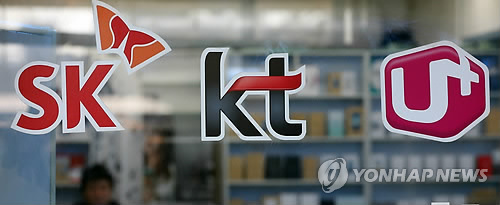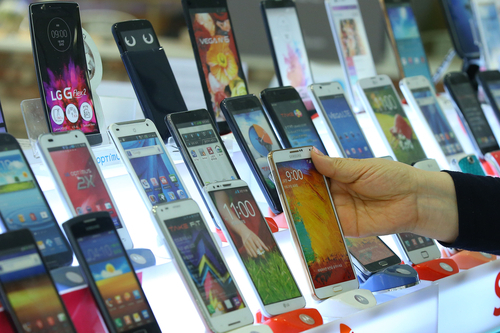With the extraordinary parliamentary session slated to end within two weeks, calls are growing to scrap or revise the law that places a limit on telecom operators and phone makers in providing subsidies for new subscribers.
South Korean consumers often change their telecom operator to buy a new handset, as the firms provide a certain amount of kickbacks to new customers on the condition of a two- or three-year contract.
Handset subsidies, which began in the late 1990s when mobile phone service first started here, have become more rampant lately. The trend has led to discrimination among customers, as tech-savvy people search online to collect as many benefits as possible.
The Mobile Device Distribution Improvement Act was first implemented in October 2014 to curb telecom operators from offering excessive subsidies to lure customers without specific standards.
Under the law, the upper limit on the subsidies was set at 330,000 won ($289) so that all consumers could receive equal subsidies from telecom carriers and phone makers.
 |
(Yonhap) |
After a lapse of more than two years, however, criticism has been growing that the act only benefits telecom operators. Last year, the nation’s three telecom carriers SK Telecom, KT and LG Uplus saved a combined 280 billion won in marketing costs and their operating incomes rose by a total of 89.3 billion won.
Meanwhile, according to a survey by Rep. Park Hong-geun of the Democratic Party of Korea, 75 percent of 1,000 consumers said they felt burdened by their telecommunication expenses and 25 percent of them said the act should be abolished.
“The act should be scrapped because it has limited the competition of telecom operators, reduced their marketing costs and grown their operating income at the sacrifice of consumer benefits,” Cho Dong-geun, a professor at Myongji University, told The Korea Herald.
The subsidy cap is slated to expire in September, and Cho contended the date should be moved up.
Reps. Shim Jae-cheol and Bae Duek-kwang from the ruling Liberty Korea Party (formerly the Saenuri Party) and Reps. Shin Kyung-min, Park Hong-geun and Byun Jae-il from the main opposition Democratic Party are in line with Cho’s views, having introduced bills to abolish the act.
Telecom operators are against such a move.
“We know many consumers oppose the subsidy cap, but that, we think, comes from the distrust of the government, and not the act itself. The act indeed has been beneficial for most consumers as it does not give benefits to only very few,” one anonymous telecom official said.
 |
(Yonhap) |
Apart from the subsidy cap, another key proposal from opposing lawmakers is to separately notify consumers about subsidies coming from telecom operators and phone makers.
Rep. Choi Myeong-gil from the Democratic Party, who represented another 10 lawmakers, proposed a bill to revise the act to include the separate notification of subsidies.
Under the current law, consumers are not able to identify how much of the subsidies come from telecom operators or phone makers such as Samsung Electronics and LG Electronics. Tech firms had strongly opposed disclosing their subsidy information when the law was implemented in 2014.
Subsidies given by tech firms are included in the store prices for new smartphones when telecom operators supply them to retail stores.
Lawmakers have claimed that separate notification may make the handset factory price -- which includes the handset cost and subsidies given by tech firms -- more transparent, and therefore lower prices.
Rep. Choi said, “Currently, the smartphone makers’ subsidies are included in the factory price and not disclosed to the public. This has been an obstacle to establishing transparent distribution channels.”
However, the handset makers said subsidy information should be confidential for companies competing in the global market.
A Samsung Electronics official, speaking anonymously, said, “We find no reason why we have to disclose the subsidy information, as sales conditions for each telecom carrier are different.”
By Shin Ji-hye (
shinjh@heraldcorp.com)









